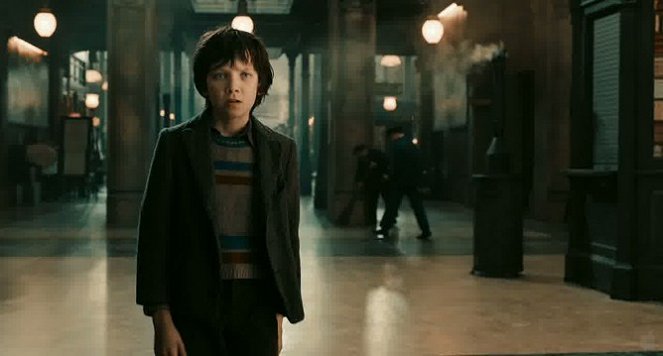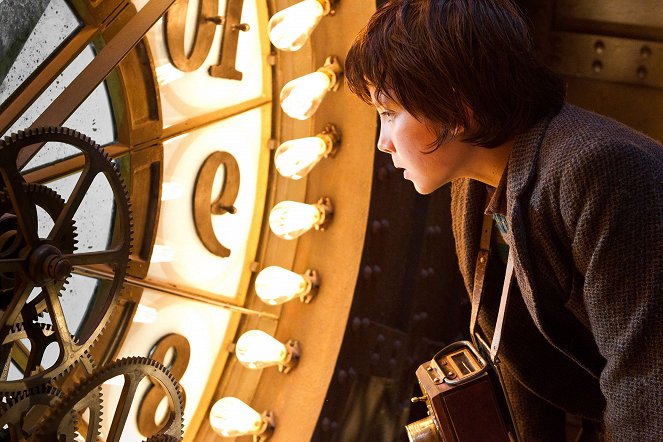Regie:
Martin ScorseseDrehbuch:
John LoganKamera:
Robert RichardsonMusik:
Howard ShoreBesetzung:
Asa Butterfield, Chloë Grace Moretz, Ben Kingsley, Sacha Baron Cohen, Helen McCrory, Jude Law, Gulliver McGrath, Christopher Lee, Frances de la Tour (mehr)Streaming (4)
Inhalte(1)
Paris zu Beginn der 30er Jahre: Der 12-jährige Hugo zieht unermüdlich in einem Pariser Bahnhof die Uhren auf und hält die Mechanik am Laufen. Eigentlich ist sein Onkel, ein Alkoholiker, dafür zuständig, aber der ist plötzlich verschwunden. Hugo lebt versteckt im Inneren der Uhren-Technik, zwischen Pendeln und Pleuelstangen. Er darf sich nur nicht vom Bahnhofsvorsteher mit seinem wachsamen Dobermann erwischen lassen, denn der würde ihn sofort in ein Waisenhaus stecken. Weil Kinder ohne Eltern dahin gehören ... (Paramount Pictures Germany)
(mehr)Videos (16)
Kritiken (10)
Aus einer originellen Vorlage ist ein einfallsloser Film geworden, in dem jede hinzugefügte Sache überflüssig ist. Ich hatte den Eindruck, dass viele Szenen nur für die gelobte 3D-Version entstanden sind (vor allem der völlig überflüssige Zugunfall). Die Geschichte ist irgendwie langwierig, sie wurde zu sehr verlängert, Sacha Baron Cohen macht sich zum Kasper… Die Regie ist geschickt und man spürt die Liebe zu Filmen. In Hugo Cabret habe ich aber nichts Besonderes gesehen. Das ist sehr schade. Meistens neige ich nicht dazu, aber diesmal habe ich wirklich Lust zu schreien: Lesen Sie das Buch, es ist viel besser!
()
Paradox: Die simpelste Filmillusion überhaupt, die auf technisch komplexeste Weise erstellt wurde. Eine Rückkehr zum anfänglichen Erstaunen. Meiner Ansicht nach liegt dies am nächsten nicht zu The Artist, sondern zu Herzogs Die Höhle der vergessenen Träume. Sogar Scorsese bemüht sich, zum magischen Moment des Ausreißens aus der Welt der Geister zurückzukehren, und zwar in eine Dimension, in der sich das Bild auf der Netzhaut in eine komplexe Welt dahinter verwandelt. Ich habe zwei Stunden im Kino der Glückseligkeit sowie der Ekstase von etwas verbracht, das es nicht gab und das auch nicht da ist. Hugo Cabrets Wert liegt nicht in seinen (sachlich anzuzweifelnden) enzyklopädischen Belehrungen, sondern in der Tatsache, dass er uns beibringt, uns über die Vorstellungskraft zu freuen - nicht über eine anregende visuelle Expansion, die ihre totale Verkümmerung hervorruft, sondern über die Reise ins Innere, in der immer die schönsten Zauber passiert sind, angeregt durch die Magie der Meister von Stift- und Zelluloid. Hoffentlich wird es mir einmal gelingen mein Kind so zu erziehen, damit der anachronistische Illusionist Hugo Cabret fürs Kind unterhaltsam ist, selbst mit seiner peinlich romantischen (und beruhigenden) Vision der Welt als einem Mechanismus, in dem alles einen festen Platz inne hat ...
()
Martin and his big movie. Not his best, but undeniably his most personal. Here Scorsese (Hugo is him) professes his lifelong love of stories in the form of a melancholic kids’ movie which isn’t so much for kids, after all. And in addition to this he was the first to prove that 3D has its rightful place in cinema, where it can be something more than a mere good-looking bolt-on. Mainly and primarily this is a darn good movie; and that is all that is important in the end.
()
2009 – Pandora. 2010 – the cyberspace of TRON Legacy 3D. 2011 – A Parisian train station. Three very different magical worlds and three reasons to pay a few crowns more of a 3D cinema ticket. In addition to the intoxicating visuals, Hugo captivates with its two child protagonists (such likeable kids is not something you see everyday in film – with Chloe is no surprise, but Asu was unknown to me) and its sincere love for cinema. As it’s clear from all the reviews, Hugo is a beautiful celebration of the beginnings of cinematography and it’s very easy to surrender to it. What’s worth noticing is that both Hugo and the silent and black and white The Artists are this year’s biggest Oscar favourites and they’ve received the most nominations. Both deal with a certain period that marked a turning point for cinema. Hugo focuses on the beginning of the century in France, and in particular the work of G. Mèliès, which was setting the trends at the time, and the turning point means WWI, due to which the epicentre of the film world moved to America. The Artist, in contrast, celebrates the American silent movies of the 20th century, and the turning point is sound. Both of them imprint the world into their format, where The Artist is a silent romantic comedy and Hugo is a fairytale that uses special effects to bring the viewer into its (3D) world (and that’s why you must watch it in 3D). Almost like Mèliès A Trip to the Moon, init? :). It’s interesting how it came together this year…
()
Some dreams do come true. The magic of film intertwines with reality, sketches with meticulously crafted images fly through the air, and Martin Scorsese pays homage to the beginnings of cinematography without getting overly sentimental or desperately trying to become a classic. Hugo seems to be a sophisticated fairy tale about a boy and his great adventure, only to ultimately transform into a fascinating journey through human imagination and determination. And that nostalgic hurricane of memories of children's books and movies, as well as fascination with unreachable worlds, managed to fully captivate me with its strength.
()



Werbung